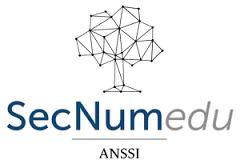
Specialized Master® in Cybersecurity Engineering
The Specialized Master in Cybersecurity Engineering provides expert training in IT security, enabling students to master the implementation of information system security in companies, from risk identification to the development of security plans designed to protect vital company resources against internal and external attacks of all kinds.
This program, accredited by the Conférence des Grandes Écoles, has been awarded the SecNumedu label by ANSSI, ranks 1st in the top 10 best Masters, MS and MBA in Cybersecurity and Systems Security in the Hauts-de-France region.

Skills
- Acquire the fundamentals of system security (configuration, operating systems, servers and networks).
- Master cryptographic techniques and mechanisms to secure data and communications.
- Detect threats and vulnerabilities to implement response strategies.
- Audit and evaluate IT systems to identify potential security flaws and propose solutions.
- Assess and manage cybersecurity risks within an organization.
- Understand and comply with cybersecurity standards and regulations.
- Manage secure networks, and protect them from network attacks
- Analyze security data to detect threats
- Manage cybersecurity projects, from concept to implementation.
- Develop a strong professional ethic and awareness of the importance of IT security.
- Raise security awareness and effectively communicate security issues
- Understand Ethical Hacking techniques, and acquire programming skills.
These skills will prepare you to face the ever-changing challenges of cybersecurity and to take up positions of responsibility within organizations concerned with protecting their digital assets against threats.
Perspectives and professions
- Cybersecurity auditor/controller/evaluator
- Cybersecurity architect
- Organizational or technical security consultant
- Information security manager
- IS security manager
- Cryptography engineer
- Security Data Analyst
- Application Security Engineer
- Cybersecurity Compliance Manager
- Incident Response Expert
- Threat Intelligence Analyst
- Cloud Security Expert



Admissions
Prerequisites
- CTI-accredited engineering degree (Bac+5)
- Master’s degree M2 (Bac+5)
- University diplomas at M1 or Maîtrise level (Bac+4) and three years’ professional experience
- Foreign diplomas of equivalent level (Bac+5)
Admissions process
The candidate’s application is studied by the educational supervisor and then submitted to an admissions jury, which meets 4 times between March and June.
The candidate is notified by email of the jury’s decision.
Candidate
Registration for the 2025/2026 session of the Specialized Master in Cybersecurity Engineering are open !
Application deadline :
- March 12, 2025 midnight for international applicants
- June 4, 2025 midnight
For further information: masteres.specialises@imt-nord-europe.fr
⚠ Candidature file ⚠
To download the 2025-2026 candidature file, click here
Calendar
Training lasts 12 months:
September to February: in-school training,
March to August: 6-month internship.
The start of the 2024 session is scheduled for early September 2024.
Program
- Network essentials (models, architectures)
- Queue modeling, network quality of service
- Fundamentals of network security
Dependability - Introduction to cryptography (mathematical foundations)
- Operating systems / Unix
- Legal and regulatory issues in cybersecurity
- Network essentials – models, architectures and protocols
- Cryptography – foundations and applications
- Biometric authentication – systems and uses
- Trust and reputation management (in English)
- Organizational auditing – the fundamentals of risk analysis, ISO 2700x family
- Risk analysis projects
- Recent cyber attacks and cyber defenses
- Hacking and technical auditing
- Network security (I)
- Intrusion detection systems (IDS)
- Digital forensics
- Access control models and kerberos authentication
- Image processing and pattern recognition in biometrics
- Wifi network security
- CNSA Stormshield certification
- Conferences
- Industrial control systems (ICS) security
- Business continuity planning and risk management
- Security management and SIMEs (Security Information Event Management)
- Dependability, a new challenge for cybersecurity?
- Security of advanced networks (II) – Security of Software-Defined
- Networking (SDN), Network
- Virtualization Functions (NFV)
- Evaluation methodologies for authentication approaches and attack and counter-attack methods (spoofing & anti-spoofing)
- Cloud computing and cloud security
- Internet of Things (IoT) and security
- Bibliographic project
- Conferences
To involve student engineers in the realities of cybersecurity, a 130-hour tutored project will be carried out jointly by professionals and IMT Nord Europe teaching and research staff.
A professional project is prepared as part of an in-company assignment in the form of a professional thesis.
It represents a privileged means of acquiring knowledge and training through research. The topic covered must correspond to a real concern in the company’s needs, and be based on the body of research in the field.
The professional thesis is defended before a jury at the end of the course. The professional thesis and the in-company assignment correspond to 30 ECTS credits.
Further information
The programme is taught in French.
Fees
Application fee: €60 non-refundable.
Programme fees :
- €9,000 for young graduates continuing their studies, jobseekers or people financing their own education ;
- €14,000 for companies
Payable in 3 instalments over the course of the academic year, the 1st instalment paid on enrolment is refundable in the event of visa refusal. Payments can be made by bank transfer or cheque.
Lieu de la formation
Rue Guglielmo Marconi, 59650 Villeneuve-d’Ascq
Contact
"*" indicates required fields
